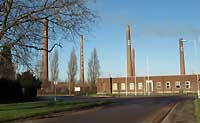|
 |
 |
 |
 |
 |
 |
 |
 |
 |
 |
 |
 |
|
|
|
|
|
|
|
|
 |
|
Lidlington at one time had one of the largest brickmaking plants in the world; however, there is little evidence of this now. The head office with the company name above the main door is the first building to be seen to the right of the unclassified road linking Lidlington to Marston. Further down the road, brick parapets can be seen on both sides. There is also a tunnel under the road where the ground haulage system of trucks on endless steel rope conveyed clay from the pit at the bottom of Brogborough Hill to the brick works. Similar parapets can also be found next to the unclassified road, known as the Baulk.
|
|
 |
 |
|
|
 |
 |
|
|
 |
|
The original Marston Valley Brick Company was formed in 1929 with Mr Whitehouse as the Managing Director. He had previously been the Manager of The London Brick Company in Peterborough. |
|
 |
 |
|
|
 |
 |
|
|
 |
|
The site was roughly triangular, its apex is at Marston Vale crossing, bounded on one side by the railway line and on the other side, the road linking Lidlington to Marston. The base was formed by the broken line of the railway between Millbrook Station and the unclassified road junction, which stands at Marston Jubilee Working Mans Club. |
|
 |
 |
|
|
 |
|
|
|
The new brick kilns called Marston Works were built in a straight-line parallel the railway, starting at Marston Crossing and finishing at Millbrook Station. Once made, the bricks were easily transferred to either railway carriages or lorries. The Company flourished and in 1935 the Ridgemont Works at Brogborough were constructed. |
|
 |
|
|
|
Brick production in the Marston Works ceased soon after the war started. The kilns were taken over by the military for storage purposes. Production restarted after the war. To satisfy the demands of a highly labour intensive industry, the workforce was supplemented by European Voluntary Workers. More labour was required so in 1951 more men were recruited from Southern Italy. |
|
 |
|
|
|
The concept of 1929 was rapidly being taken over by new technology. Forklift trucks were available to lift bricks in and out of chambers but the kilns that had been constructed made their use impossible without a costly reconstruction programme. |
|
 |
|
|
|
Marston Valley Brick Company and London Brick Company had become rivals. In a bid to control the progress of Marston Valley Brick Company, London Brick brought large areas of land around Lidlington and other local villages. In 1968 London Brick Company took over Marston Valley Brick Company, this was completed in 1971 and Marston Valley Brick Company ceased to exist. |
|
 |
|
|
|
|
|
|
|
 |
|
 |
|
|
|
For information on Stewartby Brickworks visit the Brickies website by clicking on the photograph pictured right ... |
|
|
 |
|
Back to top |
|
|
|
 |
|
|
|
|
 |
|
|
|
|
|
 |
|
|
|
|
Put your mouse over the image and prepare to take off! Then click on the plane for a 'flying visit' of Marston Vale's industry section or click the text. |
|
|


